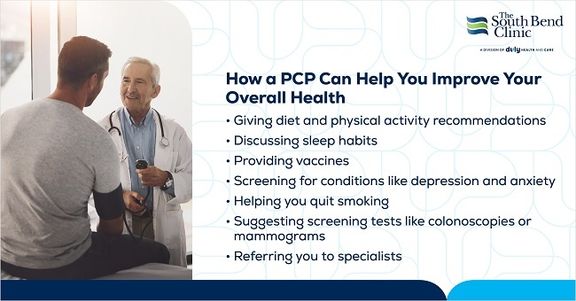If you haven’t had a physical in the past year, and don’t have one coming up, stop what you’re doing right now (well, after finishing this article) and schedule one.
If you have a chronic medical condition, like diabetes or heart disease, you may already know that a yearly visit is critical. Your primary care provider or PCP can monitor the condition, confirm that you’re getting the correct treatment, and assess how it’s affecting your overall health. They can also communicate with any specialists treating you for your condition.
But if you don’t have a chronic medical condition, and you’re usually in good health, you may be wondering, “Do I really need a yearly physical?”
The answer is a resounding “yes.” Here are four of the many reasons why it’s important to get a physical every year.
At a Glance: What Your PCP Can Do for You
- Catch silent issues early, like high blood pressure or prediabetes
- Get personalized guidance on diet, exercise, and sleep
- Stay up to date on vaccines and screenings
- Address ongoing symptoms like fatigue, headaches, or stomach issues
- Build a long-term care relationship for better health over time
Ready to take charge of your health? Schedule your annual physical today.
1. PCPs Can Detect Medical Conditions That Aren’t Causing Symptoms.
There are many medical conditions that hide in plain sight. Even though they are serious and could cause significant problems, they don’t have any symptoms, especially early on. For many of these conditions, finding them early is critical. It allows your provider to treat them before they get worse and to prevent serious – or even fatal – complications.
One of the main ones is high blood pressure (hypertension). High blood pressure occurs when the force of blood that pushes against your artery walls is too high, causing your heart to work harder to pump blood. If left untreated, it can increase your risk of heart attack or stroke.
Since it generally doesn’t cause symptoms, the only way to know for sure is to have your blood pressure measured. Your PCP can prescribe medication or help make lifestyle changes, like reducing your salt intake, to lower your blood pressure before it becomes life-threatening.
Another condition that usually isn’t symptomatic but is critical to treat early, is prediabetes. This is when your blood sugar is elevated but not high enough to be considered type 2 diabetes. Prediabetes is a precursor to developing type 2 diabetes, but there is good news. It is often reversible.
The catch is that it has to be diagnosed and managed before it turns into diabetes. As with high blood pressure, your PCP can help you find and treat prediabetes early on to reduce your risk of it becoming worse.
Read on Duly Health and Care: Your Guide to Your Annual Wellness Visit
2. They Can Help Detect Conditions That Have Minor Symptoms.
You might be having frequent symptoms like headaches or upset stomach that seem more like annoyances and can be solved by taking a pain reliever or antacid. However, these could be signs of bigger medical problems. For example:
- Constant headaches could be due to an infection or chronic sinusitis.
- Frequent stomachaches could be caused by a digestive disorder (like irritable bowel syndrome) or a food intolerance.
- Shortness of breath after physical activity could be a sign of asthma.
- Difficulty sleeping could be a symptom of sleep apnea or stress.
In some cases, what seems like a minor symptom could indicate a serious problem. For instance, while headaches generally aren’t serious, they could be caused by a tumor.
Let your provider know if you have “small” health issues. Even if the symptoms aren’t due to a medical condition, they can help you find ways to prevent or manage them so that you’re more comfortable.
Read about prioritizing annual check-ups.
3. Your PCP Can Also Help You Improve Your Overall Health and Wellness.
If you’re not always quite at the top of your game when it comes to general wellness, like eating a healthy diet or getting enough physical activity, your annual physical is a great time to reset. If you have great health habits already, talking to your PCP at a physical is a good way to learn about how your needs may be changing as you get older.

Read on Duly Health and Care: Are You Behind on Your Regular Health Screenings?
4. It’s a Good Way to Build a Relationship With Your PCP.
Seeing your PCP regularly can strengthen your relationship with them, which is key for your long-term health.
The more you see your PCP, the more they will get to know you. They will have a better idea of your personal and family medical history, which can make it easier to recognize and diagnose certain conditions. They will know your obstacles to staying healthy, like if you live in an area with a lot of pollution, share a living space with a smoker, or have a high-stress job.
Having a good relationship with your PCP can also help you build trust, which is important when problems do arise. If you’re diagnosed with an illness or chronic condition and need treatment, a strong relationship can help you trust that your provider is giving the care that’s best for your personal needs.
How to Make the Most of Your Annual Physical
Before going to your annual appointment, take stock of your health. Has anything been bothering you lately, even just a little bit? Have you noticed any changes in your day-to-day life, like frequent urination or skin irritation? While you do this, think about your medical history. Did anything change in the last year? Was an immediate family member diagnosed with a medical condition that could be genetic?
Also, prepare a list of questions ahead of time so that you don’t forget to ask anything. At your appointment, don’t be afraid to ask these questions – even if they seem minor or awkward. Your PCP is there to help you stay healthy, not to judge you. If you’re not comfortable talking to your PCP about certain issues, think about switching providers so that nothing stands in the way of getting the care you need.
Prioritize your health this year. Schedule your physical with a South Bend Clinic provider today and get the personalized care you deserve.
Health Topics:





